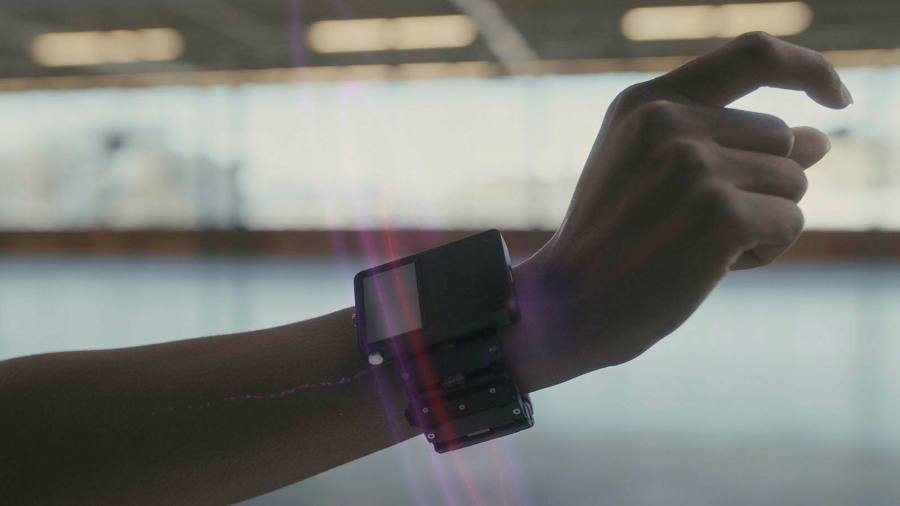Facebook revealed its vision for a bracelet that will control its next augmented reality glasses, marking the last step in the social media company’s efforts to take on Apple in the next generation of computing.
The band, which can interpret complex hand movements through sensors that pick up nerve signals from the electric motor on the wrist, will allow users to interact with the virtual world projected through their glasses with subtle finger movements, or “smart clicks”, said.
In the long run, Facebook hopes that the technology will allow users to move or manipulate virtual objects that appear superimposed in the real world, for example, typing on a virtual keyboard.
“One of the most difficult problems in augmented reality is entry,” said Mike Schroepfer, director of technology at Facebook. “From punched cards to keyboards, from mice to touch screens, new computing platforms have been defined by the way we interact with them.”
Facebook’s wearable technology is part of the company’s efforts to diversify its revenues beyond advertising © Facebook
The world’s largest social media company has been working on its first pair of smart glasses for years, which founder Mark Zuckerberg believes will be ubiquitous by the end of the decade. A preliminary headset is expected to be released later this year, albeit with limited resources.
Schroepfer declined to set a timeline for the bracelet, but said the researchers are “excited about the ability to resolve these [technical] problems in the years to come ”.
Technology companies like Apple and Fitbit, now owned by Google, have been offering smartwatches and bracelets for years to monitor exercise and receive smartphone notifications. But Facebook is the first Big Tech company to propose the use of these bracelets as an entry system for AR and virtual reality.
Other VR and AR system designers have proposed a variety of ways to control your headphones, from video game controllers to rings or even voice commands.
Facebook said it believes its system is better because the bracelets are more comfortable and intuitive to wear, while voice commands can be distorted by background noise or heard by others.
Machine learning will allow the technology to adapt to each user, monitoring their behavior to better predict what they want to do in the future.
“The system learns something about its location and key objects, like running shoes or activity recognition,” said Tanya Jonker, manager of scientific research at Reality Labs at Facebook, a team of researchers and engineers overseeing their AR and VR work.
“And you learn that in the past, you used to launch your music app when you left home with those shoes on. It then asks if you would like to play your music and allows you to confirm with just one click. “
Facebook hopes that the bracelet technology will allow users to manipulate virtual objects overlaid in the real world, such as keyboards © Facebook
Facebook has long said that its AR efforts are based on its primary mission of enriching users’ social experiences. This occurs while the company continues to diversify its revenues beyond advertising. Non-ad revenue, which includes sales of its popular Oculus VR headsets, reached $ 1.8 billion in 2020, an increase of 72 percent year-over-year.
But news of wearable developments also marks the next step in his race against the iPhone and laptop maker Apple to build the next computing platform in addition to the smartphone.
Apple, which also competes with Facebook for messaging, has invested heavily in space. It is rumored that his first headset will be released next year. The device would add to what is already a multi-billion dollar business for Apple, making accessories for the iPhone, such as smartwatch and AirPods headphones.
In 2018, Facebook added hundreds of employees to its AR hardware development team and, a year later, spent $ 1 billion on the acquisition of CTRL-Labs, a start-up that develops technology to allow people to control devices electronics with their brains.
Nicholas Colonnese, manager of scientific research at Facebook’s Reality Labs, said the company also built “more than a dozen prototypes” of bracelets that send information to users through pre-programmed vibrations and grips, with mixed success.
Along with the technical difficulties of the RA, Facebook may face privacy issues in the wake of numerous scandals about the personal information of its users. The company said it is encouraging researchers to publish their work in peer-reviewed journals and to conduct ethics workshops.


